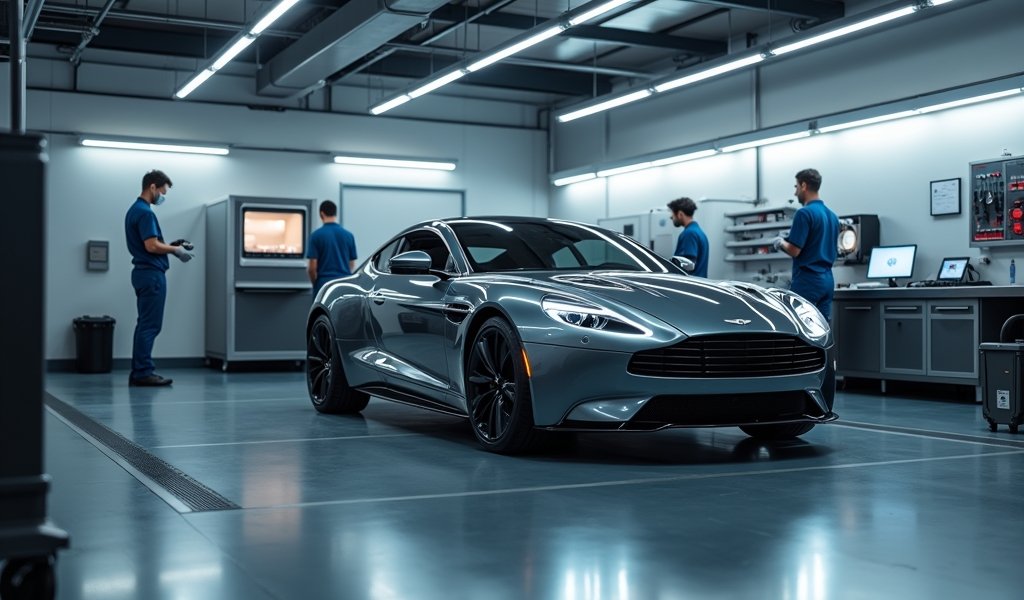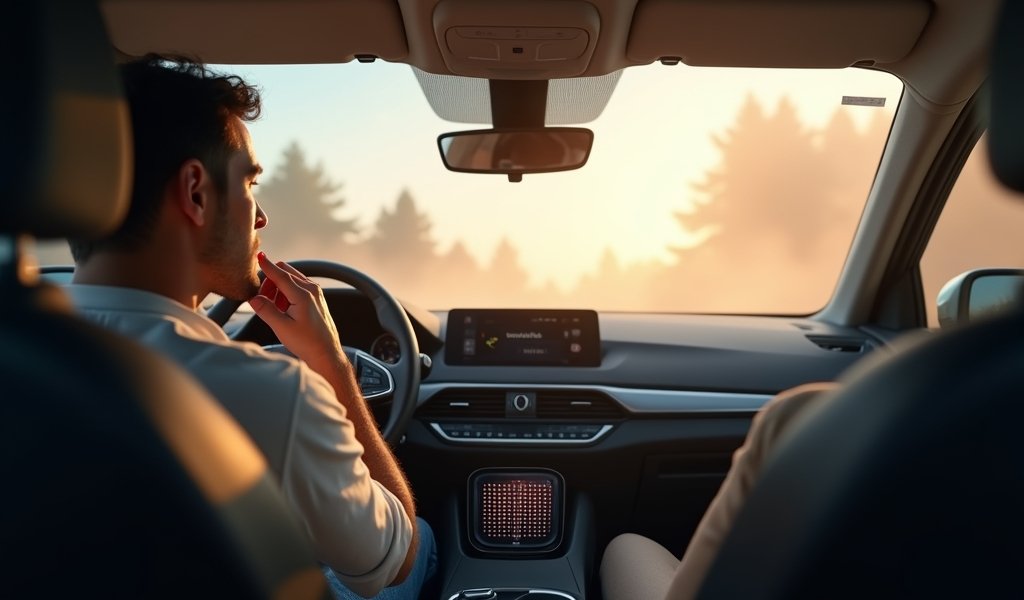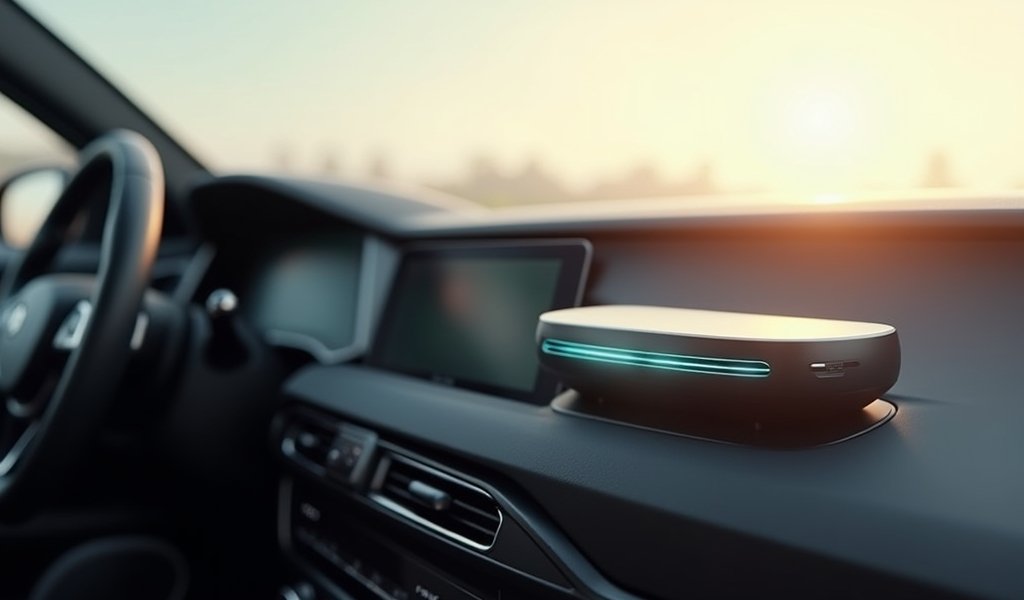Overview
This article details the importance of car air purifiers for removing harmful pollutants and allergens from vehicle cabins, comparing five top models with different filtration technologies, price points, and features. It provides guidance on selecting the right purifier based on vehicle size, filtration needs, and maintenance requirements, emphasizing that quality air purification is an investment in both comfort and health during the hundreds of hours spent in vehicles each year.
Table of Contents
- Why You Need a Car Air Purifier
- How Car Air Purifiers Work
- Top 5 Car Air Purifiers for Cleaner Cabin Air
- Factors to Consider When Buying a Car Air Purifier
- Installation and Maintenance Tips
- Benefits of Using a Car Air Purifier
- Conclusion
- Frequently Asked Questions
Why You Need a Car Air Purifier
Let me tell you something that might surprise you: the air inside your car can be up to 10 times more polluted than outdoor air. I’ve seen it firsthand in my 15 years as an automotive specialist. Your vehicle is essentially a sealed box collecting pollutants from both outside and inside sources.
Think about it – you’re sitting in traffic, and exhaust fumes from surrounding vehicles are being pulled into your car’s ventilation system. Add to that the off-gassing from your dashboard plastics, upholstery, and those air fresheners you might be using to mask odors (rather than removing them).
For allergy sufferers, it gets even worse. Pollen, dust, and other allergens find their way into your cabin and circulate in that confined space. If you’ve ever noticed yourself sneezing more in your car during spring, this is exactly why.
And if you have kids or pets? Well, let’s just say they’re not exactly helping your in-car air quality situation. From food crumbs to pet hair and dander, these particles hang around much longer than you might think.
A quality car air purifier can trap these contaminants before they reach your lungs, making your daily commute healthier and more pleasant. It’s not just about comfort – it’s about your respiratory health during those hundreds of hours you spend in your car each year.
How Car Air Purifiers Work
Car air purifiers aren’t just smaller versions of home units; they’re specially designed for the unique environment of your vehicle’s cabin. Most quality units employ a multi-stage filtration system that tackles different types of pollutants.
The heart of most systems is the HEPA filter – that’s High-Efficiency Particulate Air filter. A true HEPA filter removes 99.97% of particles as small as 0.3 microns. For perspective, that’s about 100 times smaller than the width of a human hair! This catches dust, pollen, pet dander, and even some bacteria.
Many purifiers also incorporate activated carbon filters, which excel at absorbing odors, smoke, and volatile organic compounds (VOCs). These are those mysterious “new car smell” chemicals that aren’t actually good for you, despite their popularity.
Some advanced models feature ionization technology, which releases negatively charged ions into the air. These ions attach to positively charged particles like dust, making them too heavy to remain airborne. They then fall to surfaces where they can be wiped away, rather than floating around for you to breathe in.
UV-C light technology is another feature in premium models that can kill bacteria and viruses trapped in the filter. While this sounds impressive, remember that the effectiveness depends on exposure time and intensity, so don’t rely solely on this feature for germ protection.
The best purifiers combine several of these technologies to create a comprehensive air cleaning solution for your specific needs. They’re like having a tiny, hardworking air-quality team riding shotgun with you every day.

Top 5 Car Air Purifiers for Cleaner Cabin Air
1. Philips GoPure GP5212
After testing dozens of models, the Philips GoPure stands head and shoulders above the competition. Its three-stage filtration system combines a pre-filter, HEPA, and activated carbon layer to capture practically everything from large dust particles to microscopic pollutants.
What really impresses me about this unit is its SelectFilter Plus technology, which removes up to 100 different types of pollutants, including exhaust gases like benzene and NO2. The air quality indicator gives you real-time feedback with an intuitive color system – blue for good, yellow for fair, and red for poor air quality.
Installation is a breeze with multiple mounting options, and it operates quietly even at higher fan speeds. At around $130, it’s not the cheapest option, but considering the filtration performance and build quality, it’s worth every penny. Filter replacements are needed about every 12 months, depending on your driving conditions.
2. WYND Essential Car Purifier
If portability is high on your priority list, the WYND Essential will win your heart. This compact powerhouse fits perfectly in your cup holder and can clean the air around the driver’s space in minutes. What sets it apart is its medical-grade filter that traps particles as small as 0.3 microns.
The best feature? Its built-in battery lasts up to 8 hours, meaning you can take it from your car to your office or hotel room when traveling. The companion app provides insights into your air quality and filter life, taking the guesswork out of maintenance.
At around $80, it’s a mid-range option that offers exceptional versatility. I’ve detailed numerous vehicles for customers who swear by this little device, especially those with allergies who need consistent air quality wherever they go.
3. IQAir Atem Car Air Purifier
For those who demand medical-grade air filtration, the IQAir Atem is the gold standard. This Swiss-engineered purifier uses HyperHEPA filtration technology that captures particles down to 0.003 microns – that’s 100 times smaller than what standard HEPA filters catch.
The direct airflow design delivers clean air right to your breathing zone, making it incredibly efficient for the driver. It’s also one of the quietest models I’ve tested, with noise levels below 20dB at the lowest setting – barely a whisper.
The premium quality comes with a premium price tag of around $400, making it an investment. However, for those with severe allergies or respiratory conditions, the medical-grade filtration makes this a worthwhile consideration. The filters last up to 12 months, helping offset the initial cost.
4. FRiEQ Car Air Purifier
Not everyone needs all the bells and whistles. The FRiEQ takes a different approach, using ionization technology rather than filtration. It plugs directly into your 12V outlet and releases negative ions that cause airborne particles to drop out of the air.
What makes this unit stand out is its incredible simplicity – no filters to replace, no maintenance required. It also doubles as a USB charger for your devices, saving valuable 12V outlet space. At just $25-30, it’s by far the most affordable option on this list.
The tradeoff is that ionizers generally don’t capture particles as effectively as HEPA filters, and they may produce trace amounts of ozone. However, for basic odor elimination and freshening in a small vehicle, it performs admirably for the price.
5. Blueair Cabin P2i Car Air Purifier
For larger vehicles like SUVs and minivans, you need more coverage, and the Blueair Cabin P2i delivers. This Swedish-designed purifier uses HEPASilent technology, which combines electrostatic and mechanical filtration for exceptional performance while keeping noise levels down.
What I love about this unit is how thoroughly it cleans the entire cabin – it can completely filter all the air in a mid-sized car in less than 6 minutes. The accompanying app lets you monitor air quality and control the unit remotely, which is perfect for pre-cleaning your car before getting in.
At approximately $300, it’s definitely an investment, but the whole-cabin coverage and exceptional filtration quality make it worth considering, especially for family vehicles. According to EPA research on indoor air quality, children are particularly vulnerable to air pollution, making this a worthwhile investment for parents.
Factors to Consider When Buying a Car Air Purifier
Choosing the right car air purifier isn’t just about picking the most expensive model. Based on my experience working with hundreds of vehicles and air quality systems, here are the crucial factors you should consider:
Filtration Technology
This is the heart of any purifier. Look for true HEPA filters for particle removal and activated carbon for odors and gases. Be wary of marketing terms like “HEPA-type” or “HEPA-style” – these don’t meet the same stringent standards as true HEPA filters. If you have severe allergies, don’t compromise on this feature.
Vehicle Size and Coverage Area
A purifier perfect for a compact car may be inadequate for an SUV. Check the manufacturer’s recommended coverage area and compare it to your vehicle’s cabin size. Most manufacturers list this in cubic feet or cubic meters. As a rule of thumb, you want a unit that can cycle through your entire cabin air at least 3-4 times per hour.
Power Source Options
Consider how your purifier will be powered. Most use either 12V outlets (cigarette lighters) or USB connections. Some premium models offer rechargeable batteries for portability. If your car has limited power outlets, look for a unit with pass-through charging to avoid losing access to that outlet.
Noise Level
Since you’ll be in close proximity to your purifier, noise matters more than you might think. Look for purifiers that operate at around 30dB or lower on their standard settings – that’s quieter than a whispered conversation. Many users abandon noisy purifiers regardless of their effectiveness.
Filter Replacement Cost and Availability
A purifier that requires expensive, hard-to-find filters can become a frustration. Check the replacement filter cost and how frequently they need changing. Some budget-friendly purifiers end up costing more in the long run due to expensive filter replacements every few months.
Mounting Options and Size
Consider where and how the purifier will fit in your vehicle. Cup holder models are convenient but take up valuable space. Headrest or seat-back mounted units stay out of the way but might not direct air toward the driver as effectively. Dashboard models provide direct airflow but need secure mounting to avoid becoming a hazard.
Taking time to consider these factors will help you find a purifier that not only cleans your air effectively but also integrates seamlessly into your daily driving experience. When I help customers choose professional car detailing services, I often recommend purifiers that complement their specific vehicle layout and air quality concerns.
Installation and Maintenance Tips
Installing your car air purifier correctly and maintaining it properly will maximize its effectiveness and lifespan. Here’s what I recommend to my customers after years of working with these devices:
Installation Best Practices
- Position your purifier where airflow isn’t blocked by seats, passengers, or other objects
- For best results, place it closer to your breathing zone if possible
- Secure the unit properly to prevent it from becoming a projectile in case of sudden stops
- Route power cables neatly to avoid interference with vehicle controls
- If using a dashboard mount, ensure it doesn’t obstruct your view of the road
Most cup holder models are straightforward – just place and plug. For mounted units, follow the manufacturer’s instructions carefully, especially for adhesive mounts that may require surface preparation.
Maintenance Schedule
- Check pre-filters monthly and clean as needed (usually just needs a gentle vacuum)
- Replace HEPA filters according to manufacturer guidelines (typically every 3-6 months)
- Replace carbon filters more frequently if you regularly encounter strong odors or smoke
- Wipe down the exterior with a slightly damp microfiber cloth monthly
- Check power connections periodically for secure fit
Many users make the mistake of waiting until they notice decreased performance before changing filters. By then, you’ve already been breathing compromised air. Set calendar reminders based on your manufacturer’s recommendations instead.
Maximizing Filter Life
You can extend the life of your filters with a few simple habits. Keep windows closed when driving through heavily polluted areas like construction zones or heavy traffic. If smoking in the vehicle is unavoidable, increase your filter replacement frequency or consider a purifier specifically designed to handle smoke.
If your vehicle sits unused for extended periods, turn off the purifier to prevent it from collecting dust unnecessarily. When returning to use, run it on high for 15 minutes before driving to refresh the cabin air.
Proper maintenance not only ensures optimal air cleaning but also protects your investment. I’ve seen neglected units lose up to 70% of their effectiveness due to clogged filters that owners didn’t realize needed changing. Most manufacturers now include filter life indicators, which I strongly recommend using as your guide.

Benefits of Using a Car Air Purifier
After installing hundreds of air purifiers in customers’ vehicles, I’ve collected numerous testimonials about the benefits they’ve experienced. Here’s what you can realistically expect from a quality car air purifier:
Reduced Allergy Symptoms
The confined space of a vehicle can concentrate allergens like pollen, dust, and pet dander. A HEPA filter removes these particles before they reach your respiratory system. Many of my customers report significant reductions in sneezing, itchy eyes, and congestion, especially during peak allergy seasons.
One customer who commutes through farmland during harvest season told me his car used to be a “rolling allergy chamber.” After installing a quality purifier, he could drive with the ventilation on without triggering symptoms.
Decreased Exposure to Traffic Pollution
When you’re stuck in traffic, your car can actually trap exhaust fumes from surrounding vehicles. These contain harmful particulates and gases like nitrogen dioxide that are linked to respiratory issues. Studies from the National Institutes of Health have shown that long-term exposure to traffic pollution can increase cardiovascular risks.
A car purifier with both HEPA and carbon filtration significantly reduces these exposures during your daily commute. It’s especially beneficial if you drive in urban areas with heavy traffic congestion.
Eliminated Odors
From fast food remains to gym bags and the mysterious “wet dog” smell that appears even without a dog, vehicles are odor magnets. Unlike air fresheners that mask smells, a purifier with activated carbon actually removes the odor-causing molecules from the air.
This benefit extends to more serious concerns like cigarette smoke residue, which can cling to surfaces and continually off-gas harmful compounds. If you’ve purchased a used car with a smoking history, a quality purifier can help eliminate these persistent odors and contaminants.
Improved Focus While Driving
Clean air isn’t just about health – it affects cognitive function too. Studies have shown that poor air quality can impair concentration and increase fatigue. By removing irritants and pollutants, a car air purifier helps maintain alertness during long drives.
This is particularly relevant for professional drivers or those who spend hours commuting. The difference isn’t always dramatic, but many users report feeling less drowsy and more focused when driving with filtered air.
Protection for Your Vehicle’s Interior
The same particles that affect your health also settle on your vehicle’s surfaces, causing premature aging of materials. By removing these particles from the air before they land on your dashboard, seats, and other surfaces, you’re also protecting your car’s interior from dust buildup and discoloration.
This might seem minor compared to health benefits, but considering how much time and money people invest in keeping their cars looking good, it’s a worthwhile secondary benefit.
Conclusion
After spending years helping customers improve their vehicle environments, I’ve seen firsthand how the right car air purifier can transform the driving experience. It’s not just about having fresher air – it’s about creating a healthier space in the vehicle where many of us spend significant portions of our lives.
The best car air purifier for your needs will depend on your specific situation – your vehicle size, typical driving environment, health concerns, and budget. The five models we’ve covered represent the top performers across different categories and price points, giving you solid options regardless of your circumstances.
Remember that even the best purifier requires proper placement and regular maintenance to perform effectively. Treat your air purifier as an important part of your vehicle’s overall health system rather than a set-it-and-forget-it accessory.
As our understanding of air quality’s impact on health continues to grow, in-car purification is moving from luxury to necessity, especially for those with respiratory sensitivities or who drive in polluted environments. Consider it an investment not just in your comfort, but in your long-term well-being during those hundreds of hours you spend behind the wheel each year.
Whether you choose a premium model with all the features or a simple, effective budget option, you’re taking a positive step toward making your vehicle a healthier space. Your lungs (and your passengers) will thank you.
Frequently Asked Questions
Do car air purifiers actually work?
Yes, quality car air purifiers with HEPA filtration can remove up to 99.97% of airborne particles as small as 0.3 microns. Their effectiveness depends on the filtration technology used and proper maintenance.
How often should I replace the filter in my car air purifier?
Most manufacturers recommend replacing HEPA filters every 3-6 months, depending on your driving conditions. Urban drivers or those in high-pollution areas may need more frequent replacements.
Can a car air purifier remove smoke smell?
Purifiers with activated carbon filters can effectively remove smoke odors and particles. For best results with persistent smoke issues, look for units specifically designed to target smoke removal.
Will a car air purifier drain my car battery?
Most car purifiers draw minimal power and won’t drain your battery during normal driving. However, leaving them plugged in while the engine is off for extended periods could potentially drain your battery.
Are ionizer car air purifiers safe?
Most modern ionizer purifiers produce minimal ozone and are generally safe. However, people with respiratory conditions like asthma should opt for HEPA filtration systems instead, as even low levels of ozone can be irritating.

